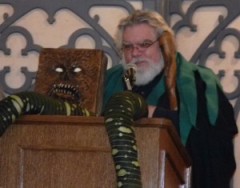
Lovecraft Triumphant
I am writing this on August 20, Lovecraft’s birthday, though strange aeons may have passed before you read it. At any rate, something occurred to me in the wee hours, and this is it. I was thinking how Lovecraft’s motifs and mythemes have so thoroughly permeated modern horror that the tail has come to wag the Tindalos Hound. The invader has devoured the host. In short, “Lovecraftian” fiction is within striking (or “spitting”?) distance of simply becoming modern horror. The genre, no longer a subgenre. No more merely a “literary cult,” as I believe Edmund Wilson called it, but the very mainstream of horror.
This doesn’t mean Lovecraftian fiction has dominated the field, that more of it is being produced than anything else, say than vampire fiction. Rather, I think that major elements of Lovecraftian fiction have become conventions of literary horror as a whole. When you read Laird Barron, Tom Ligotti, etc., etc., you can’t help recognizing elements we used to regard as uniquely Lovecraftian, but they have been baked into the cake in the manner of a presupposition, not so much a “shared world” (as in the pastiches, fan or pro, of an earlier generation) as a shared worldview. The Old Ones have become like the Satan of traditional horror fiction, one of the basic features of horror per se.
Partly this process is the result of genre-bending writing like that of Cody Goodfellow, as in his landmark novel Radiant Dawn/Ravenous Dusk (I’m still awaiting a sequel, Rampaging Doom), a perfect blending of Mythos with techno-thriller and espionage (among other things), in which viscera have become actants. Lovecraft, or profound Lovecraftian influence, becomes a major ingredient in the recipe, no longer the just the bride and groom (Asenath and Edward) ornament on top of the cake. Colin Wilson had already done this in The Mind Parasites and The Philosopher’s Stone (which, by the way, is sitting, the rock, not the book, on the mantle in my study, next to an Eradicator Superman action figure and a statue of Shiva—come on over for the tour sometime!)
As Fritz Leiber said, Lovecraft performed a Copernican Revolution (as my mentor Robert F. Streetman used to say, “Another one?”) in horror, making science the focus rather than the supernatural. I am suggesting that HPL effected yet a second revolution, or maybe a tectonic shift, by causing the horror genre to assimilate so much of his vision and ideas that these are no longer Lovecraftian subgenre markers. We no longer think of vampire fiction as being “Bram Stokerism” even if it was he who started the ball rolling. Lovecraft coinages are now part of horror per se.
Don Burleson and I would call it a case of Derrida’s “iteration paradox.” Only once a thing gets repeated, is no longer unique, can we grasp its uniqueness by seeing what kind of a thing it is. So with Lovecraft. I think, too, of something Richard Tierney told me as we were taking a stroll in a cemetery many years ago. He said he was initially reluctant to attend conventions or join fan discussions because Lovecraft was something he cherished as a private treasure. It would be rendered profane insofar as it became common property, even with other fans, and thus rendered common. We see the same “danger” in the increasing academic recognition of Lovecraft, not to mention the light-hearted commercial appropriation of Lovecraft and all things Cthulhu. Octopus bedroom slippers, for Pete’s sake! Not that I’m complaining. It’s the iteration paradox.
Lovecraft has become less the thing we view and more the lens through which we view things. Lovecraft has become de-centered. He has triumphed in transcending himself.
Robert M. Price
Hierophant of the Horde
![]()

Robert M. Price is an American theologian and writer. He teaches philosophy and religion at the Johnnie Colemon Theological Seminary, is professor of biblical criticism at the Center for Inquiry Institute, and the author of a number of books on theology and the historicity of Jesus, including Deconstructing Jesus (2000), The Reason Driven Life (2006), Jesus is Dead (2007), Inerrant the Wind: The Evangelical Crisis in Biblical Authority (2009), The Case Against the Case for Christ (2010), and The Amazing Colossal Apostle: The Search for the Historical Paul (2012).
A former Baptist minister, he was the editor of the Journal of Higher Criticism from 1994 until it ceased publication in 2003, and has written extensively about the Cthulhu Mythos, a “shared universe” created by the writer H. P. Lovecraft.
Browse Dr. Price’s books at Amazon.
If you enjoyed this article, let Bob know by commenting below — and please use the Facebook, Twitter, and Google Plus buttons below to spread the word.

